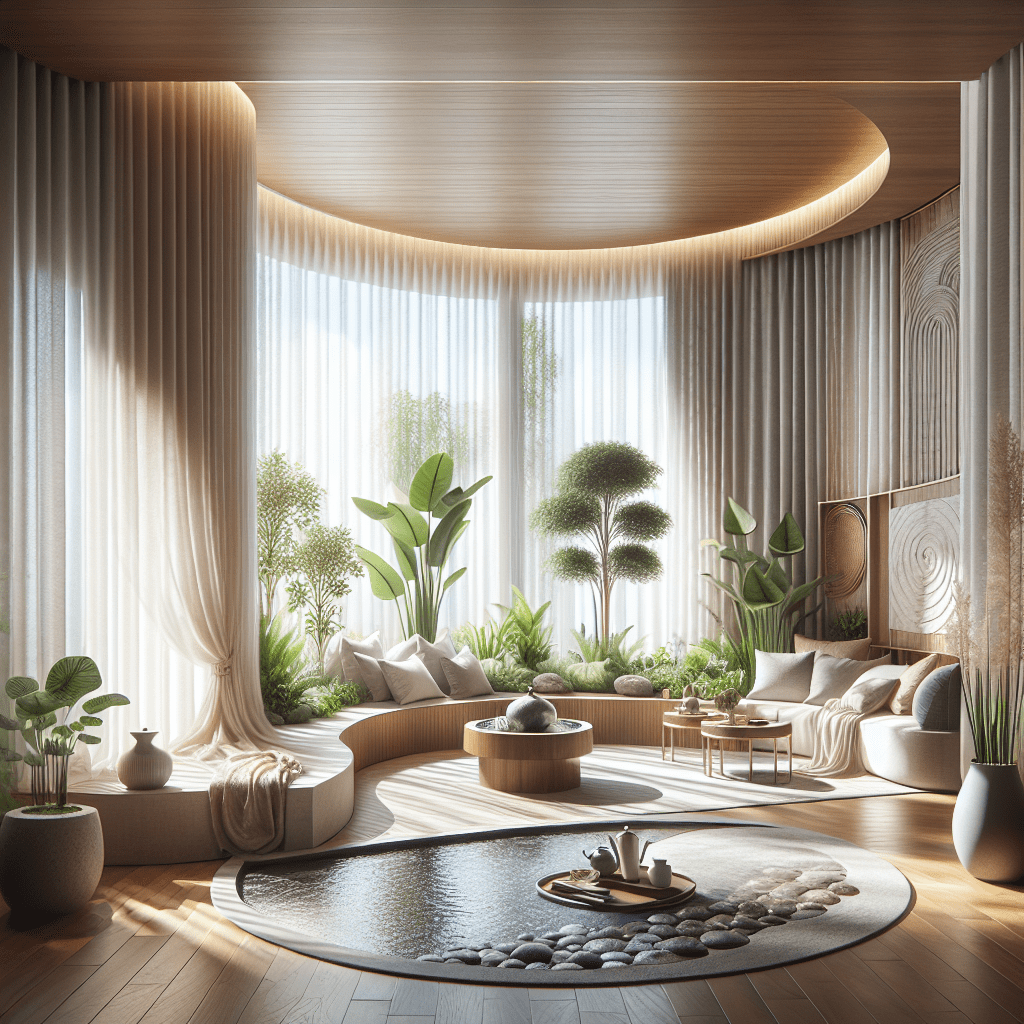Have you ever walked into a room and instantly felt more relaxed or energized? That’s not just coincidence – it might be good Feng Shui at work! This ancient Chinese practice isn’t just about arranging furniture; it’s a holistic approach to creating harmony between you and your environment that can significantly impact your health and wellbeing.
Feng Shui, which translates to “wind and water,” is a 3,000-year-old practice that focuses on balancing energy flow, or “Chi,” in our living spaces. At its core, Feng Shui recognizes what Eastern medicine has known for millennia – that we’re deeply connected to our surroundings, and our environments can either nurture or drain our vitality.
Just as traditional Eastern medicine sees the body as an interconnected system that needs balance, Feng Shui views our homes as living entities that influence our physical and emotional health. This aligns perfectly with the holistic approach to wellness that values the wisdom of time-tested traditions while embracing modern understanding.
Let’s explore ten simple Feng Shui health tips you can incorporate into your daily routine to transform your energy and wellbeing!
✨ Feng Shui Benefit:
Implementing these practices can lead to improved sleep, reduced stress, increased productivity, and a greater sense of overall wellbeing!
1. Let There Be Light: Optimize Your Lighting

One of the most fundamental Feng Shui health tips involves maximizing natural light in your living spaces. Natural sunlight not only reduces eye strain and headaches but also regulates your body’s internal clock, improving sleep quality and mood.
“Embrace natural light whenever possible,” suggests Feng Shui expert Dr. Michael Oon. “It’s the most powerful source of positive energy in your home.”
Try these simple adjustments:
- Open curtains and blinds first thing in the morning
- Trim outdoor foliage that blocks windows
- Use mirrors to reflect light deeper into rooms
- Choose sheer curtains that filter rather than block light
- Position your desk or reading chair near windows
For evenings and darker spaces, create a layered lighting approach. Avoid harsh overhead lighting that creates shadows and can drain energy. Instead, use a combination of task lighting, floor lamps, and table lamps with warm-toned bulbs (2700-3000K) to create a cozy, supportive atmosphere.
Remember that light fixtures should be cleaned regularly – dusty chandeliers or lampshades can block positive energy flow, just as stagnant energy in our bodies can lead to health imbalances.
2. Embrace Natural Materials for Grounding
Our ancestors lived in direct contact with natural materials, and our bodies still respond positively to these elements. Synthetic materials like plastic, while convenient, can create an energetic disconnect in our living spaces.
Incorporating natural materials into your home decor isn’t just aesthetically pleasing – it’s a powerful Feng Shui health tip that can help you feel more grounded and connected to the earth’s natural rhythms.
Consider integrating:
- Wooden furniture with visible grain
- Stone countertops or decorative pieces
- Cotton, linen, or wool textiles
- Clay or ceramic decorative items
- Bamboo or rattan accessories
Even small touches make a difference. A wooden picture frame, a stone coaster set, or linen throw pillows can bring natural elements into your space without a major overhaul. These materials carry stable, nurturing energy that helps create a sense of security and calm – essential foundations for good health and internal energy balance.
As one Feng Shui practitioner puts it, “Natural materials breathe life into a space. They remind us of our connection to the earth and help us feel centered and balanced.”
3. Color Your World for Wellbeing
Colors aren’t just decorative choices – they’re energetic forces that affect our emotions and physical responses. Feng Shui color theory is a sophisticated system that connects colors to the five elements (wood, fire, earth, metal, and water) and their health effects.
For better health and energy, consider these Feng Shui color tips:
- Greens and blues: Calming, restorative, and associated with growth and healing
- Soft yellows: Uplifting, supportive of digestion and intellectual clarity
- Earthy tones: Grounding, stabilizing, and nurturing
- White and light neutrals: Clarity, freshness, and mental focus
- Deep blues or blacks: Restful, introspective energies that support deep sleep
The key is balance. You don’t need to paint your entire home in these colors – small accents in the right locations can make a significant difference. For example, touches of blue in a home office can create calm focus, while gentle yellow in a dining area can support healthy digestion.
Remember that your personal response to colors matters too. If a “calming” blue actually makes you feel sad, trust your body’s wisdom and choose colors that genuinely make you feel good.
4. Purify With Plants

Plants are like nature’s air purifiers and energy refreshers, making them a staple in Feng Shui health practices. Beyond their ability to convert carbon dioxide to oxygen, they also remove toxins from indoor air and add moisture to dry environments.
“Houseplants offer great benefits for both homeowners and businesses—they clean the air, reduce stress, and provide a sense of purpose, satisfaction, and delight,” notes a recent study on biophilic design.
Some particularly beneficial Feng Shui plants include:
- Lucky Bamboo: Symbolizes good fortune and resilient health
- Jade Plant: Represents growth and renewal
- Snake Plant: One of the best air purifiers, releases oxygen at night
- Peace Lily: Removes common household toxins
- Boston Fern: Adds moisture to dry indoor air
Place plants in areas where energy might become stagnant, like corners or along empty walls. However, avoid overcrowding your bedroom with plants, as their active energy can sometimes interfere with restful sleep. One or two small plants is usually sufficient for a sleeping space.
Remember that struggling plants bring struggling energy, so choose varieties that match your light conditions and care capabilities. A thriving easy-care plant is far better for your space’s energy than a demanding plant that’s barely surviving.
5. Scent Your Space with Intention
Our sense of smell connects directly to the brain’s emotional center, making aromatherapy a powerful tool for influencing health and mood. Feng Shui health tips often include mindful use of scents to clear stagnant energy and create specific atmospheres.
Different essential oils can:
- Lavender: Promote relaxation and better sleep
- Citrus oils: Energize spaces and uplift mood
- Eucalyptus: Clear congestion and purify air
- Peppermint: Enhance mental clarity and focus
- Sandalwood: Ground energy and reduce anxiety
Use diffusers, reed diffusers, or even simple room sprays to bring these benefits into your space. The key is choosing scents mindfully rather than just masking unpleasant odors. In Feng Shui, persistent bad smells are considered indicators of stuck energy that needs to be addressed at its source.
Natural incense like sandalwood or frankincense can also be used occasionally to clear energy, though be cautious of synthetic incense that may contain harmful chemicals. Similarly, burning sage or palo santo in a practice known as “smudging” can reset your space’s energy when you feel it becoming stagnant.
6. Clear Clutter for Mental Clarity
Perhaps no Feng Shui health tip is more fundamental than dealing with clutter. When objects pile up, they create stagnant energy that can translate directly to feeling stuck, overwhelmed, or fatigued in our lives. This is similar to what happens with energy blocks in your body.
“By clearing away clutter and stagnant energy, you have more space to think,” explains one Feng Shui consultant. This mental clarity isn’t just a nice feeling – it reduces stress hormones that can damage our physical health over time.
Start with these areas:
- Bedside tables (affects sleep quality)
- Kitchen counters (influences nutrition choices)
- Desk or workspace (impacts productivity)
- Entryway (shapes how energy enters your home)
- Under-bed storage (can disrupt sleep with stagnant energy)
The goal isn’t sterile minimalism but thoughtful curation. Every item in your home should either serve a practical purpose or bring you genuine joy. Letting go of items that no longer serve you creates space for new energy, opportunities, and better health to enter your life.
7. Balance the Five Elements
WOOD
Growth & Vitality
FIRE
Passion & Energy
EARTH
Stability & Balance
METAL
Clarity & Precision
WATER
Flow & Wisdom
Eastern philosophy recognizes five fundamental elements that create and control each other: Wood, Fire, Earth, Metal, and Water. In traditional Eastern medicine, imbalances among these elements in the body can lead to health issues. Similarly, Feng Shui sees balancing these elements in your environment as crucial for wellbeing.
Each element supports different aspects of health:
- Wood: Growth, vitality, and new beginnings
- Fire: Passion, energy, and transformation
- Earth: Stability, nourishment, and groundedness
- Metal: Clarity, efficiency, and boundaries
- Water: Flow, wisdom, and emotional depth
You can incorporate these elements through materials, colors, and shapes:
- Wood: Plants, wooden furniture, vertical rectangles, green/brown colors
- Fire: Candles, lighting, triangular shapes, red/orange/purple colors
- Earth: Ceramics, square shapes, yellow/brown colors
- Metal: Metal objects, round shapes, white/gray/metallic colors
- Water: Mirrors, glass, wavy asymmetrical shapes, blue/black colors
A well-balanced space includes all five elements, with emphasis on what you personally need more of in your life. If you’ve been feeling scattered, more Earth elements might help you feel grounded. If you’re feeling stagnant, more Water elements can help energy flow. Understanding your Five Elements Body Constitution can provide deeper insights into what elements you might need to emphasize.
8. Arrange Furniture for Energy Flow
The arrangement of furniture in your home can either support or obstruct the flow of Chi (life energy). When energy can flow smoothly, you’ll likely feel more energetic and healthier; when it’s blocked or rushing, you might experience stress, fatigue, or even physical symptoms.
Key Feng Shui furniture arrangement principles include:
- Create clear pathways through rooms
- Avoid furniture with sharp corners pointing at seating areas
- Position beds and desks in the “commanding position” (able to see the door but not directly in line with it)
- Leave some space between furniture and walls to allow energy to circulate
- Round or oval tables promote better conversation and energy flow than rectangles
Pay particular attention to areas where you spend the most time. Your bed position can affect sleep quality, while your desk arrangement can influence focus and productivity. Even small adjustments, like moving a bed a few inches from the wall or angling a sofa slightly, can create noticeable improvements in how you feel in a space.
9. Create Dedicated Relaxation Zones
In our busy, technology-saturated world, having spaces dedicated to relaxation and rejuvenation is increasingly important for health. Feng Shui health tips emphasize creating distinct zones in your home that signal to your body and mind that it’s time to unwind.
Consider creating:
- A reading nook with comfortable seating and good lighting
- A meditation corner with a cushion, candle, or meaningful objects
- A tech-free zone where screens are never used
- A nature-viewing spot near a window with outdoor views
- A creative space for pursuing hobbies that bring joy
These areas don’t need to be large – even a corner of a room can become a powerful relaxation zone when intentionally designed. The key is consistency; when you regularly use these spaces for calming activities, your body begins to associate them with relaxation, making it easier to unwind.
Use soft textures, calming colors, and minimal distractions in these areas. They should feel like a sanctuary from the demands of daily life – places where you can reconnect with yourself and recharge your energy.
10. Connect with Nature Daily

While indoor Feng Shui is important, the practice also emphasizes maintaining a connection with the natural world. Modern research confirms what Eastern wisdom has long known – time in nature reduces stress hormones, lowers blood pressure, and improves immune function.
Incorporate these nature-connecting practices into your daily routine:
- Morning sunlight exposure to regulate circadian rhythms
- Barefoot time on grass or earth (often called “grounding”)
- Meals outdoors when weather permits
- Indoor activities near windows with natural views
- Evening stargazing to connect with the larger universe
Even in urban environments, finding small ways to connect with natural elements can have profound health benefits. A windowsill herb garden, a small balcony with potted plants, or regular visits to local parks can provide the nature connection that our bodies and spirits crave. These practices align with Eastern wellness wisdom that emphasizes our connection to the natural world.
Bringing It All Together
Feng Shui Wisdom:
Remember that creating harmony in your environment is an ongoing process, not a one-time event. As your life evolves, so too should your space. Stay mindful of how your surroundings make you feel, and make adjustments as needed.
These Feng Shui health tips aren’t just about creating a pretty space – they’re about aligning your environment with the natural flow of energy that supports vitality and wellbeing. Much like Eastern medical traditions that seek to balance the body’s internal energies, Feng Shui works to balance the energies in your external environment.
The beauty of these practices lies in their accessibility. You don’t need to redesign your entire home or make expensive changes. Small, intentional adjustments – opening curtains, adding a plant, clearing a cluttered surface – can create noticeable shifts in how you feel.
As you implement these Feng Shui health tips, pay attention to your body’s responses. Notice how different spaces make you feel, and trust your intuition about what your environment needs. The ancient wisdom of Feng Shui provides guidelines, but your personal experience is the ultimate measure of what works for your unique energy and needs. This personalized approach reflects the principles of total health through Feng Shui.
By harmonizing your living space according to these time-tested principles, you’re creating an environment that supports rather than depletes your vitality – a foundation for genuine wellbeing that combines the wisdom of Eastern traditions with the practical needs of modern life.



